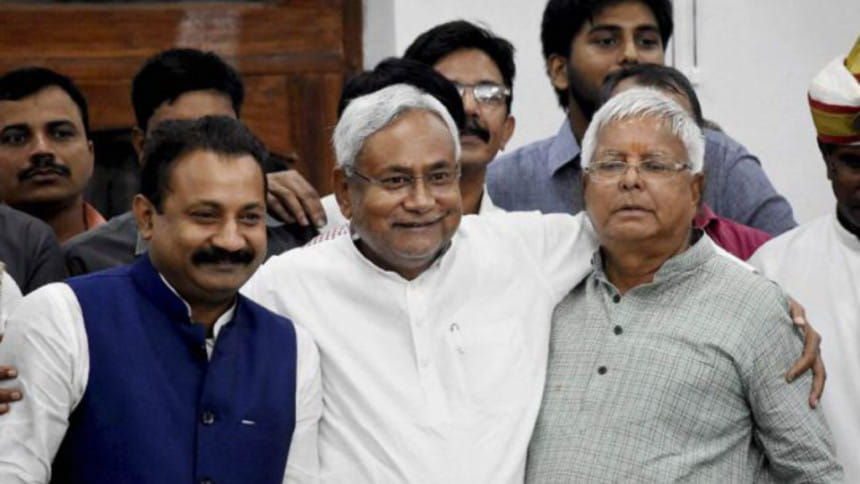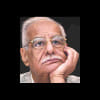Has Modi's magic waned?

Whether or not the Narendra Modi magic has waned or whether the strategy of campaigning has been faulty, the fact remains that the Bharatiya Janta Party (BJP) has been routed in Bihar. That BJP is putting up a brave front and feels its loss is because of the unity of the opposition.
The Bihar assembly election results have, nevertheless, delivered a body blow to the BJP, more specifically to the Prime Minister-party president duo of Modi and Amit Shah. The blame game that began within a couple of hours of the counting continues unabated. The angry voices within the party ranks are growing by every passing day. There will be more in the days to come.
As in any post-poll analysis, Bihar will be analysed and re-analysed many times. Undoubtedly, this was the most bitterly fought elections of all time to come. Never before has an election been based on a divisive politics of communal hate and religious intolerance. Nor have we seen an assembly poll in which dozens of central ministers campaigned and Prime Minister addressed 30-odd rallies. Party president Shah rooted himself to Bihar for over eight months to devise strategies.
Yet, when the results were declared, it was the Grand Alliance that had the last laugh. The Nitish Kumar-Lalu Prasad Yadav combine along with the Congress, which needed a makeover after continuous drubbing since 2014 general elections, quietly marched ahead in what was a landslide victory—a vote for social welfare and economic development over all forms of divisive politics of the RSS and the BJP.
In the end, as it turned out, the people of Bihar have rejected outright the BJP which rode to power at the Centre in 2014 on the Modi momentum and the so-called Gujarat model. In fact, Delhi was the first one to reject both when the Aam Aadmi Party (AAP) was voted to power with 67 out of 70 seats. No doubt, the BJP went on to taste successes in a few states like Jharkhand and Haryana and managed to form a coalition government with People's Democratic Party in Jammu and Kashmir. But Bihar was one state that the BJP banked on the most to turn the corner.
Unfortunately, it was not to be. To my mind, there are several reasons that can be attributed to the BJP loss --polarisation, reservations, cow, et al. Yet for me, it is the reasonably good governance that Nitish Kumar had provided in the last two terms that stands out. Forget the minor aberration called Jitan Ram Manji, who ruled the state for a brief period, thanks to Nitish Kumar's largesse.
In other words, the voters of Bihar wanted continuation of Nitish, the face of good governance, despite the fact that he had aligned with his once bitter rival Lalu Yadav, the Rashtriya Janata Dal chief. The RJD may have got more seats than Janata Dal United and Lalu Yadav may demand his pound of flesh during the cabinet formation. I am, however, sure that Nitish will rein in and will not disappoint the people who have reposed their faith in him. I am also hopeful that the Congress, which has a good number in the assembly, will not overlook what is happening.
I don't read too much into what Lalu Yadav had said about Nitish ruling Bihar and he, taking on Modi at the Centre, without any interference in Bihar's affairs. I can already hear murmurs of Yadav's sons being included as cabinet ministers, one of them as the deputy chief minister. This is where Nitish will have to do the real balancing act as the BJP and his NDA rivals are waiting for such an opportune moment to jump in.
I don't want to go into what went wrong with the BJP as there are poll managers of the party to analyse it. But what I can say with authority is that the Bihar example has provided a kind of template for future elections. With three states—Assam, West Bengal and Tamil Nadu—going to the polls next year, the regional parties may look for and forge some alliances on the Bihar model to take on the BJP in each of these states.
No doubt, every state has its own needs and development agenda besides a specific model to work on with local leaders. Only a clever combination like the one between Nitish Kumar and Lalu Yadav, that had the pulse of local voters, can click to the extent it did in Bihar. The pre-poll alliance has to be precise and based on a pure understanding of the local needs.
Coming back to the Modi-Shah leadership model, I am sorry to say that the duo had taken things for granted. Their arrogance, reflected during the campaigns, could be the sole reason for the party's rout. Of course, RSS chief Mohan Bhagwat added fuel to fire by raising the issue of reservation. Even the BJP leadership in Bihar has come out with statements that point to how the party went overboard on certain issues and underline that the remarks of the RSS chief did not go well with the Biharis.
It appears that Modi has lost the way and does not know how to overcome the deficiencies of bureaucracy, something which his predecessors had faced. Economic reforms announced by the party take the country to the right unashamedly. Even if Jawaharlal Nehru's socialistic pattern is abundant, the BJP cannot give a pro-rich and pro-corporate impression because a country where most people are poor has to move away from rightist policies.
I am not suggesting that the party follows the preamble of the constitution word by word. But it cannot take a line which is entirely opposite to the spirit of the constitution: the governance which is opposed to taking any step to rectify the distance which is increasing day by day between the haves and have-nots. The sooner Modi and his party realise this, the better it would be for them.
The writer is an eminent Indian columnist.

 For all latest news, follow The Daily Star's Google News channel.
For all latest news, follow The Daily Star's Google News channel. 



Comments